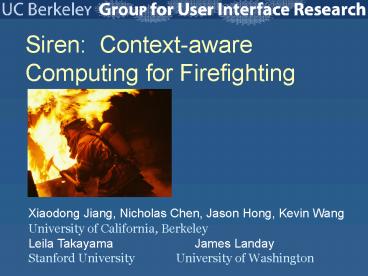Siren: Contextaware Computing for Firefighting - PowerPoint PPT Presentation
Title:
Siren: Contextaware Computing for Firefighting
Description:
University of California, Berkeley. Leila Takayama James Landay ... A map-based user interface. Use of Berkeley motes. Location beacon. Mobile sensing ... – PowerPoint PPT presentation
Number of Views:38
Avg rating:3.0/5.0
Title: Siren: Contextaware Computing for Firefighting
1
Siren Context-aware Computing for Firefighting
Xiaodong Jiang, Nicholas Chen, Jason Hong, Kevin
Wang University of California, Berkeley Leila
Takayama James
Landay Stanford University
University of Washington
2
Motivation
- Fires cause great harm
- 1,755,000 fires in the United States in 1998
- 4000 deaths, 25000 injuries, 100 firefighter
deaths / year - Information intensive task
- Firefighting is making a lot of decisions on
very little information - Convergence of sensing and communication
3
Research Overview
- Goal
- Support interaction between firefighters working
inside urban structures - Approach User-centered Design
Design Principles 4 months of field study
Prototype Solution Off-the-shelf technology
Evaluation Quick feedback
4
Outline
- Field studies results
- From field to design
- Siren architecture
- Siren messaging application
- Evaluation
- Conclusion Future work
5
Field Studies
- Method
- 4 months, 3 depts
- Interviews inwork environment
- 1 field exercise
- 2 emergency calls
- Participants
- 1 assistant chief
- 4 battalion chiefs
- 2 captains, 2 engineers
- 5 firefighters
6
Fieldwork Results
- Firefighters have an incomplete picture
- Situational assessment is done by sending
advanced team into fires - Individual firefighter confined to a limited
space - Current communication systems are inadequate
- Require explicit control
- Broadcast and ephemeral
- Detached from information gathering
- Firefighters operate in harsh environments
- Inherently unreliable nature of any infrastructure
7
Communication
There is a lot of noise on the fire ground.
Youre inside the fire is burning it makes
noise theres breaking glass theres chain saws
above your head where theyre cutting a hole in
the roof theres other rigs coming in with
sirens blaring lots of radio traffic everybody
trying to radio at the same time.
8
Need for Tacit Communication
- Context-dependent sharing of mission-critical
information - See through the eyes of fellow firefighters
- Opportunistic, spontaneous, persistent
- When communication happens is context dependent
- Often triggered by external events, without human
initiation - Can be replayed and shared
9
Tacit Communication An Example
Abandon
10
From Field to Design
- Tacit communication
- Ad-hoc P2P
- Delayed multi-hop
- Context dependence
- Robustness multiple levels of redundancy
- Path redundancy
- Storage redundancy
- Version redundancy
- Feedback redundancy
11
Siren Architecture
- Adapted Context Fabric (Hong et. al.) for a P2P
network of Wi-Fi-enabled Pocket PCs
12
Storage Manager
- An InfoSpace consists of tuples
- Each firefighter owns an InfoSpace containing
data about himself, other peers and the
environment - Tags to specify expiration
- InfoSpace snapshot
- A view maintained by each device of entities on
the Siren network - Snapshot taken by aggregating sensor readings
over a given time window - InfoSpace operators (insert, retrieve) unify
storage and communication
13
Multi-hop Communication Manager
Message id . Source . Time_Created Semantic
Slot 1 Semantic Slot 2 Semantic Slot 3
Type location Value 525 Soda Hall Confidence
70 Expiration
- Message format
- XML over HTTP
- Semantic slots
- Time-based message queuing routing
- One queue for each source
- Queue is sorted by time
- Keep forwarding to all neighbors until all
semantic slots expire - Version redundancy
- Not overwrite older messages as newer versions
arrive why?
14
Context Rule Engine
- Take InfoSpace snapshots as input, generate user
alerts - Production system consisting of if-then rules
- Currently supports five types of alerts
- dangerous place
- danger to oneself
- next to dangerous place
- others in danger
- instructions
IF (firefighter F IN room A) AND (surrounding
temperature gt 1500F) THEN (generate_alert
(firefighter F1 in danger)) AND
(generate_alert (room A is a dangerous place))
15
Siren-based Messaging Application for Firefighters
- Running on Wi-Fi-enabled Pocket PCs
- A set of context rules
- A map-based user interface
- Use of Berkeley motes
- Location beacon
- Mobile sensing
- Environmental sensing
16
Video
17
Evaluation
- Used by a group of four firefighters in their
fire house - Positives
- Communication redundancy for large complex urban
structures (hospitals, high rises, warehouses) - Location tracking enhance firefighter safety
- Like UI with no manual input
- Concerns
- Ruggedness of technology
- Risks of new technology
- Deployment issues
18
Ruggedness of Technology
Its got to be tough youve got to be able to
drop it its got to be able to take extreme
heat its got to be able to get wet.
19
Risks of New Technologies
- Thermal Imaging Cameras
- PASS System
20
Deployment Issues
- Tighter integration with existing tools (use in
conjunction with thermal imager to narrow search
areas) - Sensor deployment
- Most effective tools for us are always those we
can directly access and maintain
21
Conclusion Future Work
- Conclusion
- User-centered design of Siren
- Support tacit communication needs
- Siren messaging application evaluation
- Future Work
- Dealing with uncertainty in sensor data
- Multimodal interaction techniques
- Deployment strategy
22
Thanks to Berkeley Fire Dept El Cerrito Fire
Dept Alameda Fire Dept NSF ITR,
CITRIS Lawrence Leung
- Xiaodong Jiang
- Nicholas Chen
- Jason I. Hong
- Kevin Wang
- Leila A. Takayama
- James A. Landay
- http//guir.berkeley.edu/siren































